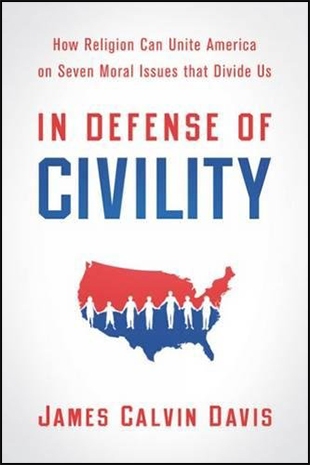"I like to define civility as the exercise of patience, integrity, humility, and mutual respect in civil conversation, even (or especially) with those with whom we disagree. All of the terms in this definition are chosen with some care, so allow me to parse them quickly.
"Patience is a key component of the virtue of civility. It pushes us to relate to our ideological opponent as a conversation partner, not simply as an obstacle to getting what we want or a heathen to evangelize. Exhibiting patience in civil conversation leads us to talk with those who disagree with us, but at least as importantly, patience insists that we listen to them. Civility requires that we have enough decency to hear our neighbor's position in his or her own terms, and familiarize ourselves with the values and viewpoints that inform it. Patience requires that we take the time to understand our opponent's position, rather than dismissing it out of hand, trivializing it, or attributing to him our own slanted reinterpretation of his beliefs.
"Related to this virtue of patience, integrity is the commitment to representing our own positions and those of our opponents truthfully. Participants in public debate who lack integrity will misrepresent their motivations or will exhibit hypocrisy in their positions across different public issues. By contrast, integrity requires that we remain consistent and honest in our reasons for advocating our positions. It also prohibits the mischaracterization of our opponents' views, a popular strategy in the current incivility in American public discourse. One of the most egregious examples of this lack of integrity occurred in the last presidential campaign, when Senator John McCain repeatedly claimed 'that Senator Obama would rather lose a war in order to win a political campaign' than admit that he was wrong in his Iraq policy. The comment dripped with accusations of treason that should have elicited more outrage than it did, had it not been so ridiculous. It is one thing to regard your opponent's position as foolish, naive, and uninformed; to accuse a fellow presidential candidate of preferring his own victory to ending a war with unacceptable human casualties betrays a stunning lack of integrity from a politician whose reputation was built on this virtue.
"The third virtue of civility, humility, recommends that we enter every public conversation open to the possibility that we could change our minds, that we could be persuaded to think something different than we believe now. This is not a retreat into that relativism that we earlier rejected. It is instead a nod toward human fallibility, an acknowledgment that even the brightest or most pious does not know, has not seen, has not experienced everything that may be relevant to the issues before us. Even if we enter public debate with a deep commitment to our beliefs, humility keeps us open to the possibility that our beliefs may be refined by what we encounter in those conversations.
"Sometimes that refining might be drastic; we may conclude after conversation that we were wrong and our opponent was right, and we may reverse our position. Perhaps our beliefs are informed in more subtle ways by an openness to the position of others. Perhaps we leave the conversation with substantially the same views, but we understand an aspect of the issue better than we did before. Perhaps we sympathize with our opponents and have a greater appreciation for the way our position causes them pain than we did before (even if we ultimately conclude that we cannot conscientiously abandon our views). Even these more incremental changes are accomplishments for healthy public discourse. They are a move toward common understanding, even if they fall short of consensus. They are possible only if citizens engage one another with the humility and openness to be affected by the encounter.
"When we take the time to listen patiently to and learn from another, we are in a greater position to exercise mutual respect for one another, the fourth component of public civility. Civility requires that in the midst of our most meaningful and intractable disagreements, we still extend the courtesy of respect. This means more than avoiding demonizing one another, as is so common in our public debates. It also means respecting each other's right to represent moral worldviews in public. It means not disqualifying your neighbor from the conversation or dismissing his views as unimportant because he is conservative, or liberal, or religious, or not. Civility requires that, even if I think you are tragically mistaken, I honor your right to participate in the American enterprise of public moral conversation.
"Because it does not ignore or whitewash differences, civility cannot guarantee consensus on any issue. Americans will not suddenly come to an agreement over Roe v. Wade if they only adopt a more civil tone to their debate. Civility does promise progress, however, because it allows us to better understand one another and helps us learn how to coexist with people with whom we vehemently disagree. As Os Guinness puts it, 'What we are looking for [in civility] is not so much truths that can unite us as terms on which we can negotiate and by which we can live with the differences that divide us.' "
